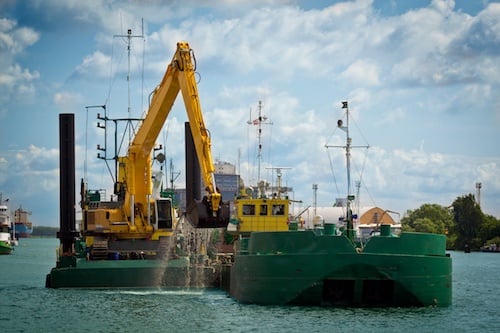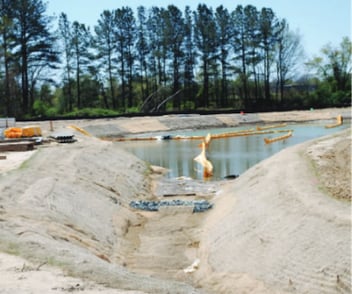Polymer Technology Approved by FL Department of Transportation
Florida DOT Approves use of HaloKlear Dual Product System

Bothell, WA, April 23, 2013 – HaloKlear, the clean water technology brand that develops and manufactures HaloKlear water clarification products for the construction, mining and dredging industries, has announced that its HaloKlear Dual Product System (DPS) has been added as a reimbursable pay item to a list of construction water treatment Best Management Practices by the Florida Department of Transportation (FDOT). HaloKlear will be the only all-natural, fully biodegradable polymer to be approved for this designation for use in all applicable FDOT projects.
The State of Florida's concern and tangible action in addressing the effects of treatment chemicals on local fish and fauna combined with the FDOT's stringent regulations in this arena provide clear leadership in influencing standards for other states in their approach to construction water remediation. Prior to approval, HaloKlear DPS underwent extensive toxicity testing and site performance reviews. In granting approval, the FDOT recognizes HaloKlear DPS as a safe and effective solution to clear turbid water in its construction project applications for both fresh and salt water.
This approval will now allow engineers to easily specify the use of HaloKlear DPS into their water treatment processes during planning for DOT projects. Contractors will be reimbursed for use onsite. Additionally, if turbidity levels are not being met through other treatments, contractors and project managers can now easily deploy HaloKlear DPS on-site to meet the required standards prior to discharging into the environment.
The HaloKlear Technical Sales Manager based in Florida commented, "Receiving the Florida Department of Transportation's approval changes the game. Building on the recent approval by the Washington State Department of Ecology for DPS, this validates the tremendous value of our scientific innovation in this critical field of use, clearly demonstrating once again that cleaner, greener, better performing chemistries do not have to cost more when total costs of use and disposal are taken into account. HaloKlear DPS has a proven track record of success across the U.S. and in countries where stormwater discharge is strictly regulated. Florida can now benefit from more widespread use of HaloKlear DPS in the field."
Bob Davis, owner of Pure Polymer Solutions and long time HaloKlear partner, affirms, "We rely on HaloKlear DPS to provide consistent, high-quality results, especially when working around sensitive environments. The approval by Florida Department of Transportation helps us bring solutions to partners struggling with the inconsistent performance of other treatments, such as polyacrylamides."
HaloKlear DPS uses all-natural, biodegradable polymers that perform on a wide array of soil types and pH ranges. In contrast to other products on the market, the HaloKlear Dual Product System creates dense flocs with great sheer strength and a low water content that settle very quickly. Solids can be efficiently removed from the water column -- increasing performance and productivity while keeping costs low. In addition, HaloKlear DPS is extremely flexible with a successful track record in active, passive, and semi-passive deployment.
Applications using the HaloKlear DPS can use a fast and easy in-field residual test kit to detect the presence of residual polymers in the effluent, making the system especially attractive on stormwater management projects in Florida District No. 6 (Miami/Keys), which require residual testing. Polyacrylamides, a synthetic, cannot be readily detected in the field. The HaloKlear Residual Test Kit ensures that virtually no product is released into the environment -- just clean water.
This article is reposted from Water World. View the original article here: http://www.waterworld.com/articles/2013/04/new-water-treatment-technology-approved-by-fl-dept--of-transport.html



